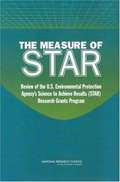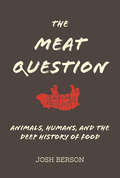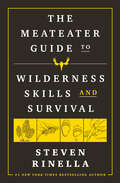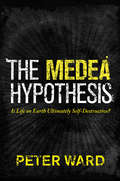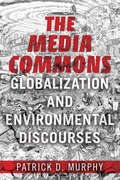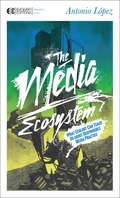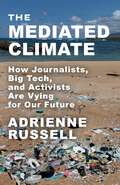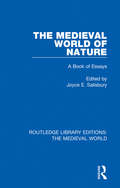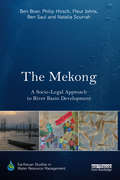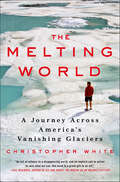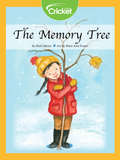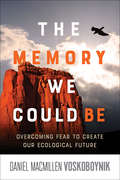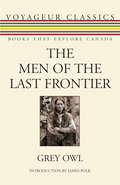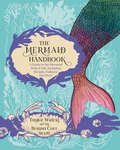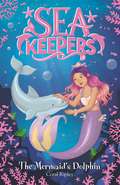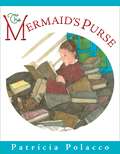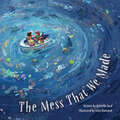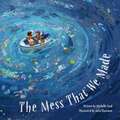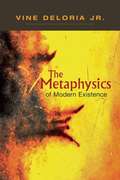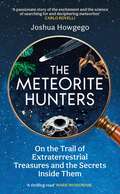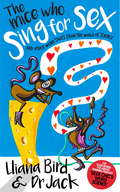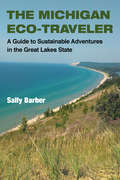- Table View
- List View
The Meaning of Wilderness (A Fesler-Lampert Minnesota Heritage Book)
by Sigurd F. OlsonSigurd F. Olson (1899-1982) was one of the greatest environmentalists of the twentieth century. A conservation activist and popular writer, Olson introduced a generation of readers to the importance of wilderness. He served as president of the Wilderness Society and the National Parks Association and as a consultant to the federal government on wilderness preservation and ecological problems. He earned many honors, including the highest possible from the Sierra Club, National Wildlife Federation, and Izaak Walton League. Olson is perhaps best known, though, for his many books that express the wonder, awe, and peace he found in the wilderness, including the nature classics The Singing Wilderness, Listening Point, and Reflections from the North Country. While these books have greatly influenced subsequent environmentalist movements and writers such as Annie Dillard and Barry Lopez, a major portion of Olson&’s wilderness writing-much of it originating as speeches-has been relatively inaccessible, scattered in a number of magazines and obscure books over a period of more than fifty years, or never published at all. The Meaning of Wilderness gathers together the most important of Sigurd Olson&’s articles and speeches, making them available for the first time. The book also contains an introduction and chapter-by-chapter commentary by Olson&’s authorized biographer, David Backes, that help the reader discover the various facets of Olson&’s wilderness philosophy and their development over time. A lively look at the evolution of one of environmentalism&’s greatest figures, The Meaning of Wilderness will be essential reading for Olson fans, historians, and outdoors people around the country.
The Measure of STAR: Review of the U.S. Environmental Protection Agency's Science To Achieve Results (STAR) Research Grants Program
by Committee to Review EPA's Research Grants ProgramThe report favorably reviews the U. S. Environmental Protection Agency's competitive research grants program, finding that it has yielded significant new findings and knowledge critical for EPA's decision-making process. Established in 1995, the grants program was designed to enable the nation's best scientists and engineers to explore new ways to safeguard the environment and protect public health. The program awards about $100 million a year in grants and fellowships to independent investigators, multidisciplinary teams, and graduate students at universities and nonprofit institutions.
The Meat Question: Animals, Humans, and the Deep History of Food (The\mit Press Ser.)
by Josh BersonA provocative argument that eating meat is not what made humans human and that the future is not necessarily carnivorous.Humans are eating more meat than ever. Despite ubiquitous Sweetgreen franchises and the example set by celebrity vegans, demand for meat is projected to grow at twice the rate of demand for plant-based foods over the next thirty years. Between 1960 and 2010, per capita meat consumption in the developing world more than doubled; in China, meat consumption grew ninefold. It has even been claimed that meat made us human—that our disproportionately large human brains evolved because our early human ancestors ate meat. In The Meat Question, Josh Berson argues that not only did meat not make us human, but the contemporary increase in demand for meat is driven as much by economic insecurity as by affluence. Considering the full sweep of meat's history, Berson concludes provocatively that the future is not necessarily carnivorous.Berson, an anthropologist and historian, argues that we have the relationship between biology and capitalism backward. We may associate meat-eating with wealth, but in fact, meat-eating is a sign of poverty; cheap meat—hunger killing, easy to prepare, eaten on the go—enables a capitalism defined by inequality. To answer the meat question, says Berson, we need to think about meat-eating in a way that goes beyond Paleo diets and PETA protests to address the deeply entwined economic and political lives of humans and animals past, present, and future.
The MeatEater Guide to Wilderness Skills and Survival
by Steven RinellaAn indispensable guide to surviving everything from an extended wilderness exploration to a day-long boat trip, with hard-earned advice from the host of the show MeatEater as seen on NetflixFor anyone planning to spend time outside, The MeatEater Guide to Wilderness Skills and Survival is the perfect antidote to the sensationalism of the modern survival genre. Informed by the real-life experiences of renowned outdoorsman Steven Rinella, its pages are packed with tried-and-true tips, techniques, and gear recommendations. Among other skills, readers will learn about old-school navigation and essential satellite tools, how to build a basic first-aid kit and apply tourniquets, and how to effectively purify water using everything from ancient methods to cutting-edge technologies. This essential guide delivers hard-won insights and know-how garnered from Rinella&’s own experiences and mistakes and from his trusted crew of expert hunters, anglers, emergency-room doctors, climbers, paddlers, and wilderness guides—with the goal of making any reader feel comfortable and competent while out in the wild.
The Medea Hypothesis: Is Life on Earth Ultimately Self-Destructive?
by Peter WardIn The Medea Hypothesis, renowned paleontologist Peter Ward proposes a revolutionary and provocative vision of life's relationship with the Earth's biosphere--one that has frightening implications for our future, yet also offers hope. Using the latest discoveries from the geological record, he argues that life might be its own worst enemy. This stands in stark contrast to James Lovelock's Gaia hypothesis--the idea that life sustains habitable conditions on Earth. In answer to Gaia, which draws on the idea of the "good mother" who nurtures life, Ward invokes Medea, the mythical mother who killed her own children. Could life by its very nature threaten its own existence? According to the Medea hypothesis, it does. Ward demonstrates that all but one of the mass extinctions that have struck Earth were caused by life itself. He looks at our planet's history in a new way, revealing an Earth that is witnessing an alarming decline of diversity and biomass--a decline brought on by life's own "biocidal" tendencies. And the Medea hypothesis applies not just to our planet--its dire prognosis extends to all potential life in the universe. Yet life on Earth doesn't have to be lethal. Ward shows why, but warns that our time is running out. Breathtaking in scope, The Medea Hypothesis is certain to arouse fierce debate and radically transform our worldview. It serves as an urgent challenge to all of us to think in new ways if we hope to save ourselves from ourselves.
The Media Commons: Globalization and Environmental Discourses
by Patrick D MurphyToday's global media sustains a potent new environmental consciousness. Paradoxically, it also serves as a far-reaching platform that promotes the unsustainable consumption ravaging our planet. Patrick Murphy musters theory, fieldwork, and empirical research to map how the media communicates today's many distinct, competing, and even antagonistic environmental discourses. The media draws the cultural boundaries of our environmental imagination--and influences just who benefits. Murphy's analysis emphasizes social context, institutional alignments, and commercial media's ways of rendering discussion. He identifies and examines key terms, phrases, and metaphors as well as the ways consumers are presented with ideas like agency and the place of nature. What emerges is the link between pervasive messaging and an "environment" conjured by our media-saturated social imagination. As the author shows, today's complex, integrated media networks shape, frame, and deliver many of our underlying ideas about the environment. Increasingly--and ominously--individuals and communities experience these ideas not only in the developed world but in the increasingly consumption-oriented Global South.
The Media Ecosystem
by Antonio LopezIn The Media Ecosystem, Antonio Lopez draws together the seemingly disparate realms of ecology and media studies to present a fresh and provocative interpretation of the current state of the mass media--and its potential future. Lopez explores the connections between media and the environment, arguing that just as the world's powers have seized and exploited the physical territories and natural resources of the earth, so, too, have they colonized the "cultural commons"--the space of ideas that everyone shares. He identifies the root of the problem in the privileging of "mechanistic" thinking over ecological intelligence, which recognizes that people live in a relationship with every other living thing on the planet. In order to create a more sustainable media ecosystem--just like the preservation of organic ecosystems--we must reconnect our daily media activities to their impact on others and the environment. To become "organic media practitioners," we must become aware of the impact of media use on the environment; recognize media's influence on our perception of time, space, and place; understand media's interdependence with the global economy; be conscious of media's interaction with cultural beliefs; and develop an ethical framework in order to act upon these understandings. Above all, Lopez calls for media producers and consumers alike to bring a sense of ritual and collaboration back to the process of communication, utilizing collective intelligence and supporting a new culture of participation. Containing both wide-reaching analysis and practical tips for more conscious media use, The Media Ecosystem is designed for all those who seek a more sustainable future.From the Trade Paperback edition.ent. Be aware of the environments that engage your attention. What do these environments (be they computer interfaces, shopping malls, churches, or forests) demand of your awareness? What possibilities or restrictions do they afford? · Know your gadget. Our media gadgets are part of vast networks of material extraction, production, and waste. Disengage those systems of power that are enabling environmental destruction and injustice. · Know your connectivity. Every screen is a portal. Such portals are nodes into vast possibilities of experience. Enter into these spaces with eyes wide open and feet on the ground. You are the medium for the planet's spirit. Channel wisely.
The Mediated Climate: How Journalists, Big Tech, and Activists Are Vying for Our Future
by Adrienne RussellTo what extent does journalism deserve blame for the failure to address climate change over the last thirty years? Critics point out that climate coverage has often lacked necessary urgency and hewed to traditional notions of objectivity and balance that allowed powerful interests—mainly fossil fuel companies—to manufacture doubt. Climate journalism, however, developed alongside the digital media landscape, which is characterized by rampant misinformation, political polarization, unaccountable tech companies, unchecked corporate power, and vast inequalities. Under these circumstances, journalism struggled, and bad actors flourished, muddling messages while emissions mounted and societies struggled to avert catastrophe.The Mediated Climate explores the places where the climate and information crises meet, examining how journalism, activism, corporations, and Big Tech compete to influence the public. Adrienne Russell argues that the inadequate response to climate change is intertwined with the profound challenges facing the communications environment. She demonstrates that the information crisis is driven not only by technological changes but also by concentrated power that predates the rise of digital media companies. Efforts to improve climate coverage must take into account the larger social and material contexts in which journalism operates and the broader power dynamics that shape public discourse. Drawing on interviews with journalists and activists, Russell considers the ways recent movements are battling misinformation. She offers timely recommendations to foster engagement with climate issues and calls on readers to join in efforts to reshape the media landscape to better serve the public interest.
The Medieval World of Nature: A Book of Essays (Routledge Library Editions: The Medieval World #46)
by Joyce E. SalisburyOriginally published in 1993, The Medieval World of Nature looks at how the natural world was viewed by medieval society. The book presents the argument that the pragmatic medieval view of the natural world of animals and plants, existed simply to serve medieval society. It discusses the medieval concept of animals as food, labour, and sport and addresses how the biblical charge of assuming dominion over animals and plants, was rooted in the medieval sensibility of control. The book also looks at the idea of plants and animals as not only pragmatic, but as allegories within the medieval world, utilizing animals to draw morality tales, which were viewed with as much importance as scientific information. This book provides a unique and interesting look at the everyday medieval world.
The Mekong: A Socio-legal Approach to River Basin Development (Earthscan Studies in Water Resource Management)
by Ben Boer Fleur Johns Ben Saul Philip Hirsch Natalia ScurrahAn international river basin is an ecological system, an economic thoroughfare, a geographical area, a font of life and livelihoods, a geopolitical network and, often, a cultural icon. It is also a socio-legal phenomenon. This book is the first detailed study of an international river basin from a socio-legal perspective. The Mekong River Basin, which sustains approximately 70 million people across Cambodia, China, Laos, Myanmar, Thailand and Vietnam, provides a prime example of the socio-legal complexities of governing a transboundary river and its tributaries. The book applies its socio-legal analysis to bring a fresh approach to understanding conflicts surrounding water governance in the Mekong River Basin. The authors describe the wide range of uses being made of legal doctrine and legal argument in ongoing disputes surrounding hydropower development in the Basin, putting to rest lingering caricatures of a single, ‘ASEAN’ way of navigating conflict. They call into question some of the common assumptions concerning the relationship between law and development. The book also sheds light on important questions concerning the global hybridization or crossover of public and private power and its ramifications for water governance. With current debates and looming conflicts over water governance globally, and over shared rivers in particular, these issues could not be more pressing.
The Melting World: A Journey Across America's Vanishing Glaciers
by Christopher WhiteGlobal warming usually seems to happen far away, but one catastrophic effect of climate change is underway right now in the Rocky Mountains. In The Melting World, Chris White travels to Montana to chronicle the work of Dan Fagre, a climate scientist and ecologist, whose work shows that alpine glaciers are vanishing rapidly close to home. For years, Fagre has monitored the ice sheets in Glacier National Park proving that they—and by extension all Rocky Mountain ice—will melt far faster than previously imagined. How long will the ice fields survive? What are the consequences on our environment? The Melting World chronicles the first extinction of a mountain ecosystem in what is expected to be a series of such global calamities as humanity faces the prospect of a world without alpine ice.
The Memory Tree
by Shari MaserThroughout the seasons, a family enjoys their backyard tree until it needs to be cut down. The family plants a sapling in its place.
The Memory We Could Be: Overcoming Fear to Create Our Ecological Future
by Daniel Macmillen Voskoboynik“Voskoboynik’s book offers an exhilarating introduction to our ecological crisis, what caused it, and how we can imagine a better future.” —Jason Hickel, author of Less Is MoreThe Memory We Could Be moves beyond the sterile, technical language around climate change and ecology to humanize the abstraction of global warming and bring different voices into the conversation.Drawing on sources from anthropology to hydrology, botany to economics, agronomy to astrobiology, medicine to oceanography, physics to history, the author weaves a lyrical and powerful story of our relationship with nature.The book has three parts:“Past” addresses memory. Our inability to comprehend our staggering present partly lies in our ignorance of our staggering past. We peer into the black box of history to understand how we got here. We go on a journey across the roots of our ecological crisis, from the Roman Empire to the forests of Burma, from Congolese rubber plantations, to Colombian oil fields.“Present” illustrates how climate change is shaping our world today, explores how it relates to poverties and inequalities, and equips readers with a set of intuitive instruments to understand climate impacts.“Future” looks at alternatives and strives to illustrate in human terms the world we could lose and the world we can win. It asks what we can do and develops a transformative vision of a more ecological and equitable economy.The Memory We Could Be is vital reading for all of humanity.“A gripping review of where we’ve been, where we are, and where we may be headed.” —Michael E. Mann, author of The New Climate War
The Men of the Last Frontier
by Grey Owl James PolkIn 1931 Grey Owl published his first book, The Men of the Last Frontier, a work that is part memoir, part history of the vanishing wilderness in Canada, and part compendium of animal and First Nations tales and lore. A passionate, compelling appeal for the protection and preservation of the natural environment pervades Grey Owls words and makes his literary debut still ring with great relevance in the 21st century. By the 1920s, Canadas outposts of adventure had been thrust farther and farther north to the remote margins of the country. Lumbermen, miners, and trappers invaded the primeval forests, seizing on natures wealth with soulless efficiency. Grey Owl himself fled before the assault as he witnessed his valleys polluted with sawmills, his hills dug up for hidden treasure, and wildlife, particularly his beloved beavers, exterminated for quick fortunes.
The Mermaid Handbook: A Guide to the Mermaid Way of Life, Including Recipes, Folklore, and More
by Taylor Widrig Briana Corr Scott&“Contains profiles of mermaids from around the world complete with folklore about each maiden . . . a must-have if you are fascinated with mermaids.&” —BeachcombingThe book mermaids-in-training have been waiting for. From history and folklore to recipes and tips for ocean preservation, as well as profiles and original illustrations of mer-maidens from around the world, The Mermaids Handbook features everything you need to know to follow the mermaid way of life.]Over 40 healthy and accessible recipes, developed by author Taylor Widrig of Mermaid Fare, a Nova Scotia–based company specializing in wild and cultivated sea vegetables, include scrumptious starters like Mermaid Kaiso Seaweed Salad, new classics like Dulse, Lettuce, and Tomato Sandwich and Creamy Wakame Casserole, as well as healthy snacks like Smoothie Bowls and Energy Bites, and even homemade beauty products, such as the Coconut Sea Hair Mask—for that salty sea-hair.Includes an introduction by Dr. Alan Critchley with everything you&’ve ever wanted to know about seaweeds and original 2-colour illustrations by artist Briana Corr Scott (The Book of Selkie).&“Nova Scotia sea-vegetable advocate Taylor Widrig is hoping to lure a new generation into the depths with her debut book . . . Written in a conversational tone, Widrig&’s scientific explanations are fascinating and age appropriate.&” —Quill & Quire
The Mermaid Summer
by Mollie HunterWith the help of her brother Jon, nine-year-old Anna daringly seeks to discover the secret means to undo a mermaid's curse upon their grandfather.
The Mermaid's Dolphin: Book 1 (Sea Keepers #1)
by Coral RipleyDive into a dolphin adventure! The first book in a magical new mermaid series about saving our seas.When Emily, Grace and Layla rescue a dolphin from a fishing net, they get swept away on a magical mermaid adventure! The girls are chosen to become Sea Keepers - guardians of the underwater world. The oceans desperately need their help, and not just because of pollution. . . An evil mermaid named Effluvia has stirred up a storm of rubbish - and the Sea Keepers must stop her! Can they find a magic pearl and save a beautiful cove for the creatures who live there?
The Mermaid's Purse
by Patricia PolaccoBased on the life of beloved author-illustrator Patricia Polacco&’s own amazing grandmother, this wonderful celebration of reading and community is as exhilarating as it is heartwarming. Young Stella loves books so much, her books begin to take over the farmhouse. &“Why, Stell, you need your own library to hold those books,&” her pa tells her, so he and the neighbors build her one! She calls it &“the Mermaid&’s Purse,&” since the midwife said Stella was born in one. Stella opens the Purse to her neighbors and travels around the countryside, sharing her books door-to-door. Not everyone gives them a chance at first, like grouchy Pig Ears Lonsberry. But farmer Dunkle sure changes his mind when information in a book saves his sick sheep. Eventually, everybody comes to love the Mermaid&’s Purse—so when a tornado destroys it, scattering Stella&’s precious books far and wide, the whole community rallies to help.
The Mess That We Made
by Michelle LordThe Mess That We Made explores the environmental impact of trash and plastic on the ocean and marine life, and it inspires kids to do their part to combat pollution. Simple, rhythmic wording builds to a crescendo ("This is the mess that we made. These are the fish that swim in the mess that we made.") and the vibrant digital artwork captures the disaster that is the Great Pacific Garbage Patch. Children can imagine themselves as one of the four multi-ethnic occupants of the little boat surrounded by swirling plastic in the middle of the ocean, witnessing the cycle of destruction and the harm it causes to plants, animals, and humans. The first half of the book portrays the growing magnitude of the issue, and the second half rallies children and adults to make the necessary changes to save our oceans. Facts about the Great Pacific Garbage Patch, ocean pollution, and how kids can help are included in the back matter.
The Mess That We Made
by Michelle LordThe Mess That We Made explores the environmental impact of trash and plastic on the ocean and marine life, and it inspires kids to do their part to combat pollution. Simple, rhythmic wording builds to a crescendo ("This is the mess that we made. These are the fish that swim in the mess that we made.") and the vibrant digital artwork captures the disaster that is the Great Pacific Garbage Patch. Children can imagine themselves as one of the four multi-ethnic occupants of the little boat surrounded by swirling plastic in the middle of the ocean, witnessing the cycle of destruction and the harm it causes to plants, animals, and humans. The first half of the book portrays the growing magnitude of the issue, and the second half rallies children and adults to make the necessary changes to save our oceans. Facts about the Great Pacific Garbage Patch, ocean pollution, and how kids can help are included in the back matter.
The Metaphysics of Modern Existence
by David E. Wilkins Vine Deloria Jr. Daniel R. WildcatVine Deloria Jr., named one of the most influential religious thinkers in the world by Time, shares a framework for a new vision of reality. Bridging science and religion to form an integrated idea of the world, while recognizing the importance of tribal wisdom, The Metaphysics of Modern Existence delivers a revolutionary view of our future and our world. David E. Wilkins holds the McKnight Presidential Professorship in American Indian Studies at the University of Minnesota. Daniel R. Wildcat is the director of the American Indian studies program and the Haskell Environmental Research Studies Center at Haskell Indian Nations University.
The Meteorite Hunters: On the Trail of Extraterrestrial Treasures and the Secrets Inside Them
by Joshua HowgegoWant to join the ultimate cosmic treasure hunt? 'They fall from the sky, and tell us about the universe: a passionate story of the excitement and the science of searching for and deciphering meteorites.' Carlo Rovelli Meteors, with their ethereal, glowing trails slashing through the atmosphere, have entranced us for centuries. But these extraterrestrial visitors are also inestimably valuable. Not just for collectors, who can make their fortunes tracking them down, but for scientists too. Meteorites are the most ancient objects we know, unblemished time capsules from the birth of the solar system. Following in the footsteps of passionate hobbyists, ground-breaking scientists and intrepid adventurers, Joshua Howgego takes a rollicking ride through the world of meteorite hunting. Join the seasoned practitioners braving the elements as they scour the Sahara and ice sheets of Antarctica. Discover how, closer to home, one unlikely hero – a self-taught jazz guitarist – is uncovering the countless micrometeorites scattered across the rooftops of our cities. And meet the professor searching for the rarest of the rare: fossil meteorites, entombed in rock since the days of the dinosaurs. Finding these stones from space is just the beginning. As scientists tease out their secrets, they piece together an unexpected new history of the solar system, with implications that extend to one of the most fundamental questions we can ask: how did life on earth begin?
The Mice Who Sing For Sex: And Other Weird Tales from the World of Science
by Lliana Bird Dr Jack LewisLliana Bird and Dr Jack Lewis tackle the strange and surreal phenomena from the depths of the oceans to the limits of the far flung universe; the dark corners of your laundry basket to the forgotten compartments of your fridge. Packed with unusual facts and stories of the absurd each of the fascinating insights is told with the Geek Chic team's inimitable humour and wit.An hilarious exploration all things bizarre from the world of science, The Mice Who Sing for Sex takes on weighty issues including heavy metal loving sharks, life-threatening skinny jeans, our impending jellyfish apocalypse and of course, the singing mice of the title.
The Mice Who Sing For Sex: And Other Weird Tales from the World of Science
by Jack Lewis Lliana BirdLliana Bird and Dr Jack Lewis tackle the strange and surreal phenomena from the depths of the oceans to the limits of the far flung universe; the dark corners of your laundry basket to the forgotten compartments of your fridge. Packed with unusual facts and stories of the absurd each of the fascinating insights is told with the Geek Chic team's inimitable humour and wit.An hilarious exploration all things bizarre from the world of science, The Mice Who Sing for Sex takes on weighty issues including heavy metal loving sharks, life-threatening skinny jeans, our impending jellyfish apocalypse and of course, the singing mice of the title.
The Michigan Eco-Traveler: A Guide to Sustainable Adventures in the Great Lakes State
by Sally BarberMichigan offers some of the most wonderfully diverse recreation opportunities in the country. The Michigan Eco-Traveleris for a new and growing breed of leisure traveler and adventurer--the individual seeking to experience the pleasant peninsulas responsibly by minimizing his or her eco-footprint. The book introduces readers to the importance of eco-friendly travel and highlights some of the best eco-conscience venues across the state that offer activities from golfing to skiing to sailing and much more. The book also examines environmental pressures on the state's recreational resources, revealing the critical need for joining together in conservation practices, and offers travelers helpful tips for evaluating the sustainability of their own favorite recreational spots. Whether you're a weekend traveler, extreme adventurer, or family on vacation, The Michigan Eco-Travelerlights the way to a greener getaway. Naturalists, conservationists, and hospitality experts will find the book equally helpful in responding to the ever rising demand for sustainable recreation.

